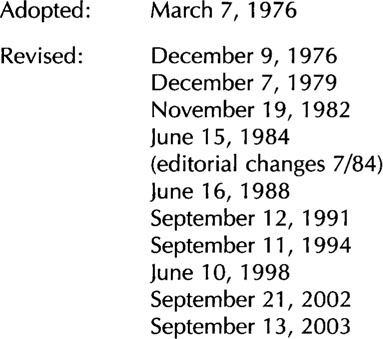Society POLICY ETHICS
ASME requires ethical practice by each of its members and has adopted the following Code of Ethics of Engineers as referenced in the ASME Constitution, Article C2.1.1.
Code of Ethics of Engineers
The Fundamental Principles
Engineers uphold and advance the integrity, honor and dignity of the engineering profession by:
- Using their knowledge and skill for the enhancement of human welfare;
- Being honest and impartial, and serving with fidelity the public, their employers and clients; and
- Striving to increase the competence and prestige of the engineering profession.
The Fundamental Canons
- Engineers shall hold paramount the safety, health and welfare of the public in the performance of their professional duties.
- Engineers shall perform services only in the areas of their competence.
- Engineers shall continue their professional development throughout their careers and shall provide opportunities for the professional and ethical development of those engineers under their supervision.
- Engineers shall act in professional matters for each employer or client as faithful agents or trustees, and shall avoid conflicts of interest or the appearance of conflicts of interest.
- Engineers shall build their professional reputation on the merit of their services and shall not compete unfairly with others.
- Engineers shall associate only with reputable persons or organizations.
- Engineers shall issue public statements only in an objective and truthful manner.
- Engineers shall consider environmental impact in the performance of their professional duties.
- Engineers shall consider sustainable development in the performance of their professional duties.
The Board on Professional Practice and Ethics maintains an archive of interpretations to the ASME Code of Ethics (P-15.7). These interpretations shall serve as guidance to the user of the ASME Code of Ethics and are available on the Board's website or upon request.
Reponsibility: Council on member Affairs/Board of Professional Practice and Ethics

The Institute OF Electrical AND Electronics Engineers (IEEE)
Code of Ethics
We, the members of the IEEE, in recognition of the importance of our technologies affecting the quality of life throughout the world, and in accepting a personal obligation to our profession, its members and the communities we serve, do hereby commit ourselves to the highest ethical and professional conduct and agree:
- to accept responsibility in making engineering decisions consistent with the safety, health and welfare of the public, and to disclose promptly factors that might endanger the public or the environment;
- to avoid real or perceived conflicts of interest whenever possible, and to disclose them to affected parties when they do exist;
- to be honest and realistic in stating claims or estimates based on available data;
- to reject bribery in all its forms;
- to improve the understanding of technology, its appropriate application, and potential consequences;
- to maintain and improve our technical competence and to undertake technological tasks for others only if qualified by training or experience, or after full disclosure of pertinent limitations;
- to seek, accept, and offer honest criticism of technical work, to acknowledge and correct errors, and to credit properly the contributions of others;
- to treat fairly all persons regardless of such factors as race, religion, gender, disability, age, or national origin;
- to avoid injuring others, their property, reputation, or employment by false or malicious action;
- to assist colleagues and co-workers in their professional development and to support them in following this code of ethics.
Approved by the IEEE Board of Directors, August 1990
Internet Reference:
www.ieeeusa.org/documents/career/career_library/ethics.html
The American Society OF Civil Engineers (ASCE)
Code of Ethics
Fundamental Principles
Engineers uphold and advance the integrity, honor and dignity of the engineering profession by:
- using their knowledge and skill for the enhancement of human welfare and the environment;
- being honest and impartial and serving with fidelity the public, their employers and clients;
- striving to increase the competence and prestige of the engineering profession; and
- supporting the professional and technical societies of their disciplines.
Fundamental Canons
- Engineers shall hold paramount the safety, health and welfare of the public and shall strive to comply with the principles of sustainable development in the performance of their professional duties.
- Engineers shall perform services only in areas of their competence.
- Engineers shall issue public statements only in an objective and truthful manner.
- Engineers shall act in professional matters for each employer or client as faithful agents or trustees, and shall avoid conflicts of interest.
- Engineers shall build their professional reputation on the merit of their services and shall not compete unfairly with others.
- Engineers shall act in such a manner as to uphold and enhance the honor, integrity, and dignity of the engineering profession.
- Engineers shall continue their professional development throughout their careers, and shall provide opportunities for the professional development of those engineers under their supervision.
As adopted September 25, 1976 and amended October 25, 1980, April 17, 1993 and November 10, 1996.
Further guidelines on interpretation are available at: